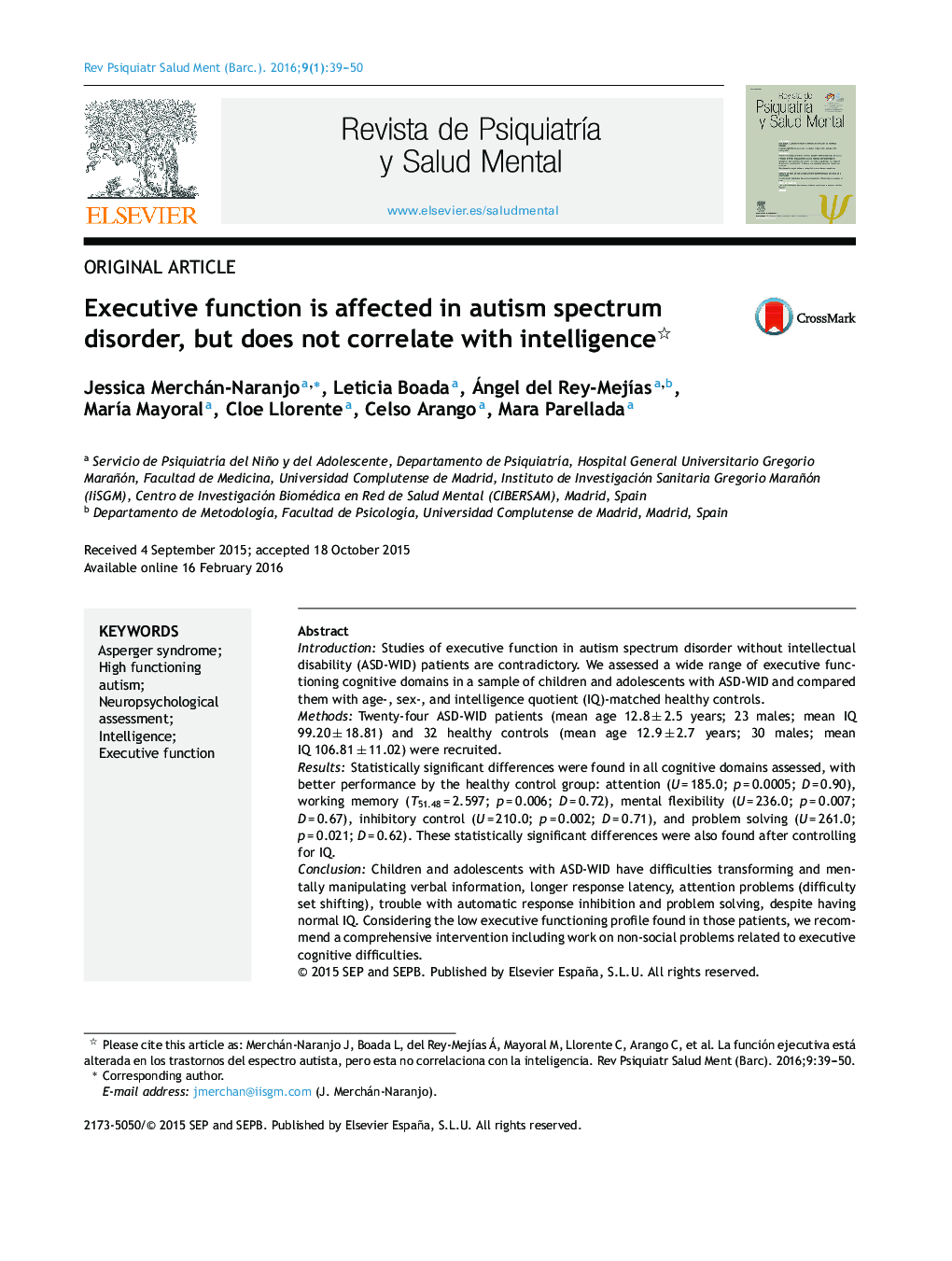| کد مقاله | کد نشریه | سال انتشار | مقاله انگلیسی | نسخه تمام متن |
|---|---|---|---|---|
| 4191392 | 1278274 | 2016 | 12 صفحه PDF | دانلود رایگان |
IntroductionStudies of executive function in autism spectrum disorder without intellectual disability (ASD-WID) patients are contradictory. We assessed a wide range of executive functioning cognitive domains in a sample of children and adolescents with ASD-WID and compared them with age-, sex-, and intelligence quotient (IQ)-matched healthy controls.MethodsTwenty-four ASD-WID patients (mean age 12.8 ± 2.5 years; 23 males; mean IQ 99.20 ± 18.81) and 32 healthy controls (mean age 12.9 ± 2.7 years; 30 males; mean IQ 106.81 ± 11.02) were recruited.ResultsStatistically significant differences were found in all cognitive domains assessed, with better performance by the healthy control group: attention (U = 185.0; p = 0.0005; D = 0.90), working memory (T51.48 = 2.597; p = 0.006; D = 0.72), mental flexibility (U = 236.0; p = 0.007; D = 0.67), inhibitory control (U = 210.0; p = 0.002; D = 0.71), and problem solving (U = 261.0; p = 0.021; D = 0.62). These statistically significant differences were also found after controlling for IQ.ConclusionChildren and adolescents with ASD-WID have difficulties transforming and mentally manipulating verbal information, longer response latency, attention problems (difficulty set shifting), trouble with automatic response inhibition and problem solving, despite having normal IQ. Considering the low executive functioning profile found in those patients, we recommend a comprehensive intervention including work on non-social problems related to executive cognitive difficulties.
ResumenIntroducciónLos estudios reflejan datos contradictorios sobre un posible deterioro en el funcionamiento ejecutivo en niños y adolescentes con trastorno del espectro autista sin discapacidad intelectual (TEA-SDI). El objetivo del estudio es evaluar el perfil cognitivo de funcionamiento ejecutivo en niños y adolescentes con TEA-SDI y compararlo con el de controles sanos pareados en sexo, edad, estatus socioeconómico, nivel educacional y cociente intelectual (CI).MétodosVeinticuatro pacientes con TEA-SDI (edad media 12,8 ± 2,5 años; 23 varones; media de CI 99,20 ± 18,81) y 32 controles (edad media 12,9 ± 2,7 años; 30 varones; media de CI 106,81 ± 11,02) fueron seleccionados.ResultadosSe encontraron diferencias estadísticamente significativas en todos los dominios cognitivos evaluados a favor de un mejor rendimiento por parte del grupo control: atención (U = 185,0; p = 0,0005; D = 0,90), memoria de trabajo (T51,48 = 2,597; p = 0,006; D = 0,72), flexibilidad cognitiva (U = 236,0; p = 0,007; D = 0,67), control inhibitorio (U = 210,0; p = 0,002; D = 0,71) y solución de problemas (U = 261,0; p = 0,021; D = 0,62). Estas diferencias se mantuvieron cuando se realizaron los análisis controlando por CI.ConclusiónLos niños y adolescentes con TEA-SDI tienen dificultades para transformar y manipular mentalmente información verbal, presentan latencias de respuesta mayores, problemas atencionales (dificultades en el cambio del set), problemas en la inhibición de respuestas automáticas, así como en la solución de problemas, a pesar de tener un CI normal. Teniendo en cuenta las dificultades en funcionamiento ejecutivo de estos pacientes, se recomienda una intervención integral, que incluya el trabajo en este tipo de dificultades.
Journal: Revista de Psiquiatría y Salud Mental (English Edition) - Volume 9, Issue 1, January–March 2016, Pages 39–50
